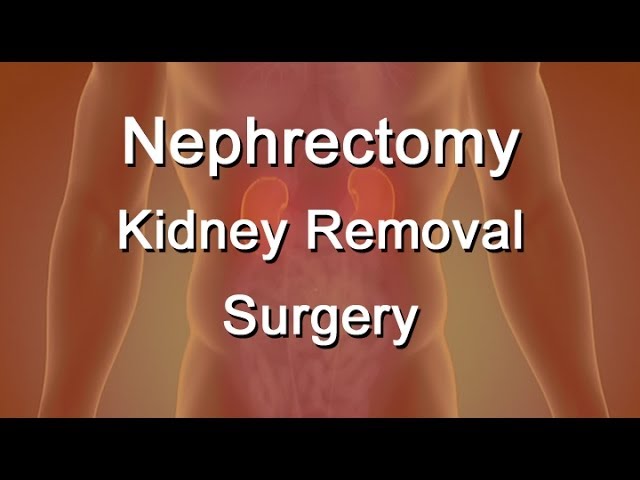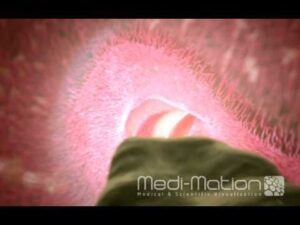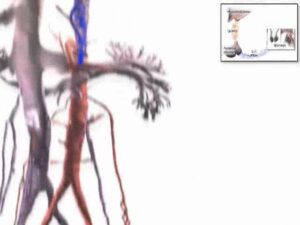A nephrectomy is a procedure to remove all or part of a kidney. When a surgeon removes the entire kidney, the procedure is called a complete or radical nephrectomy. With a partial nephrectomy, the surgeon removes diseased tissue from a kidney and leaves healthy tissue in place. The procedure may be done through a single large incision in the abdomen or side (open nephrectomy) or through a series of small incisions in the abdomen (laparoscopic nephrectomy). A donor nephrectomy is the removal of a healthy kidney to be transplanted into a person who needs a functioning kidney. A nephrectomy is most often performed to remove a cancerous tumor, or abnormal tissue growth, in a kidney. The most common kidney cancer in adults is called renal cell carcinoma, which begins in the cells that line the small tubes within your kidneys. Children are more likely to develop a kind of kidney cancer called Wilms’ tumor, which is probably caused by the poor development of kidney cells. The decision about how much kidney tissue to remove in a renal carcinoma nephrectomy depends on: Whether a tumor is confined to the kidney Whether there is more than one tumor How much of the kidney is affected Whether the cancer affects nearby tissue How well the other kidney functions The surgeon makes a decision based on the results of imaging tests, which may include: Ultrasound, an image of soft tissues produced with the use of sound waves Computerized tomography (CT), a specialized X-ray technology that produces images of thin cross-sectional views of soft tissues Magnetic resonance imaging, which uses a magnetic field and radio waves to produce cross-sectional views or 3-D images The patient receives general anesthesia before surgery and is unconscious during the entire procedure. During the procedure – Specific features of a nephrectomy vary depending on how the surgery is performed and how much of the kidney is removed. After the procedure – Recovery time and the length of the patient’s hospital stay will vary depending on overall health and the type of nephrectomy performed. Laparoscopic surgery generally results in a shorter recovery time than open surgery. The long-term complications of a nephrectomy are related to potential problems of living with less than two complete, fully functioning kidneys. Although overall kidney function is less following a nephrectomy, the remaining kidney tissue usually works well enough to allow for a relatively normal life. Visit our YouTube channel to see hundreds more videos on health, wellness, and nutrition topics. https://www.youtube.com/channel/UCoTm4B8NthtgFg-KEO-g8nw Follow us in Facebook https://www.facebook.com/Healthy-Wealthy-And-Wise-101342581558460 Follow us on Pinterest https://www.pinterest.com/gpmck/healthy-wealthy-and-wise/

Nephrology Surgeries Video – 2
- Post author:
- Post published:May 16, 2021
- Post comments:0 Comments
You Might Also Like

Arm Workout Tips | Hammer Curls | Biceps Workout

Tricep Exercises: Close Grip Press, Skull Crushers, & French Press

Branches of Physiotherapy Video – 24

Keto Diet, Keto Foods, Keto Recipes Video – 4

Cellular structure of bone | Muscular-skeletal system physiology | NCLEX-RN | Khan Academy

Digestion Animation – Six Parts Water

Diazepam – Do’s and don’ts | Drugslab

My Strength and Conditioning Definition

These Are The Symptoms and Signs You May Have a Blood Clot in Your Leg

Seth Rollins CrossFit Jesus | Ep.37 Teams Workout

Body Composition Measurement

Stop Hair Loss And Improve Your Vision With This Natural Remedy

Use Of Finasteride In Androgenic Alopecia (hairfall)

Anabolic androgenic steroids – physical side effects

Pediatric Physiotherapy Video – 5

Surya Namaskar Video – 4

The Role of Estrogen in Pregnancy

HGH, Growth Hormones & Plant Hormones Video – 23

How to Do a One Handed Tricep Extension with Dumbbells

Cognitive Psychology Video – 4

WHICH BODY TYPE ARE YOU? How to Train & Eat for YOUR body type?

Anabolic Steroids – History, Definition, Use & Abuse Video – 7

Why do you feel cold when you have fever?

Bodybuilding Video – 1

Physio ball Prone Single Leg /Alternating reverse low back h

Multivitamin-Produkte – sinnvoll? (60 fps)

Leg Press-8

Dealing with Menopause, Naturally

Best Legal Steroids For Fast & Safe Muscle Building

Hormone Levels

Anatomy Meaning

What is Arthritis – Causes, Symptoms, Treatments and Diet Tips in English

Massage Video – 2

Keto Diet, Keto Foods, Keto Recipes Video – 24

Lying Tricep Extensions (with Swiss Bar)

Omega 3 Fatty acids | mechanism of action and health benifits

BODYBUILDING MOTIVATION ~ This will Destroy you

Floor Triceps Dip

Orlistate: como funciona o medicamento para perda de peso

Defining Training Intensity

ERGOGENIC AIDS

